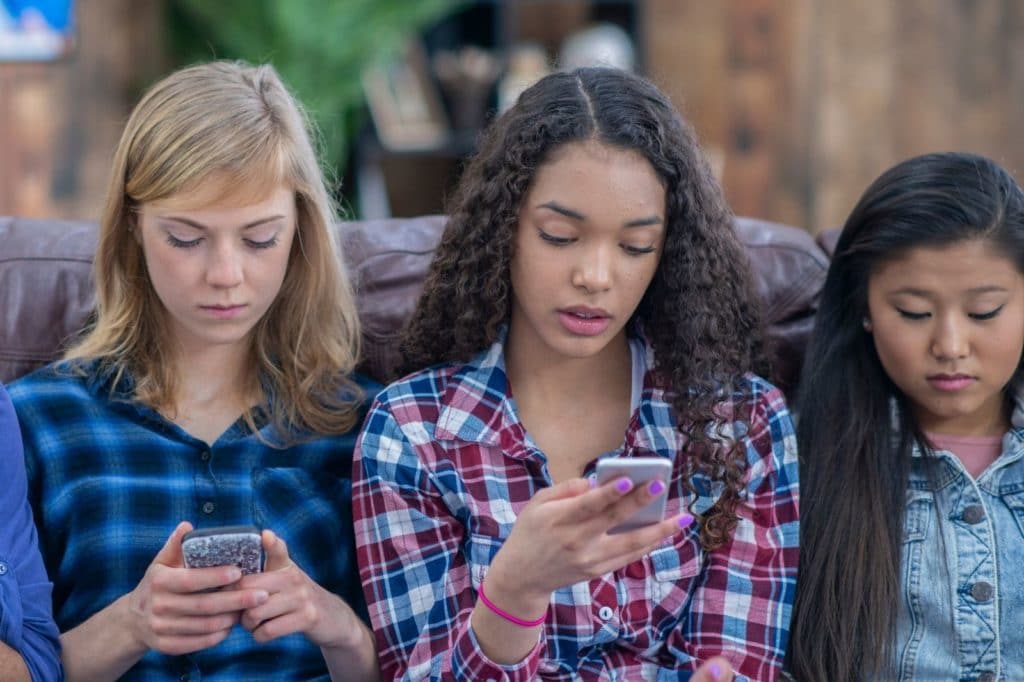Technology is rapidly evolving and regardless of how you feel about it, the changes are here to stay as a part of our daily lives. According to a 2018 Pew Research Center survey, “95% of teens now report they have a smartphone or access to one. These mobile connections are in turn fueling more-persistent online activities: 45% of teens now say they are online on a near-constant basis.”
Dr. Joshua Essery discusses the effects that technology has on our youth during our weekly Parents Chats. As the Director of Outpatient Clinical Services at Clarity Child Guidance Center, Dr. Essery has significant insight into how technology impacts our kids’ mental wellness.
identity, self-esteem, and body image
The use of social media can impact a teenager’s identity, self-esteem, and body image. It cannot be stated enough that people only show the best version of themselves on social media. Genuinely expressing who you are and how you feel might not create something post-worthy. Even mundane topics are given an angle to highlight a point or make a joke. Even when you try to be authentic, social media cannot possibly fit the entire context of a situation.
No matter your age, there is constant pressure for people to compare themselves to their peers. We ask questions like: “who am I?”, “how many followers do I have?”, “how many likes did my last post get?”, “how long are my snap streaks?” Teenagers especially feel pressure to portray themselves in a socially acceptable way to make people like them. Unfortunately, adding marketing metrics to interpersonal relationships can have the unintended effect of damaging kids’ mental health.
relationship development
Relationship development and attachment is now being mediated through a screen. Society is shifting more towards online engagement rather than in person activities. During COVID-19, this has been an incredible boon, helping fight off isolation during a pandemic. FaceTime allows us to speak face-to-face in real time with a relative halfway across the world. However, Dr. Essery says that he has had clinical experiences where kids with parents living in another country start to identify their devices as their parent rather than understanding that their parents are speaking to them through the device. For good or bad, we are social creatures who require physical stimulation and social interactions. The lack of in-person connectivity leaves kids missing those important components.
Dr. Jean M. Twenge, author of “iGen: Why Today’s Super-Connected Kids Are Growing Up Less Rebellious, More Tolerant, Less Happy–and Completely Unprepared for Adulthood–and What That Means for the Rest of Us”, stated in her presentation at ClarityCon Reimagined, “the number of teens who get together with their friends nearly every day dropped by over 40%. More teens are spending their free time alone in their room and on their phones, computers or games.”
According to Dr. Twenge:
“All screen activities are linked to less happiness, and all off screen activities are linked to more happiness. Eighth graders who spend 10 or more hours a week on social media are 56 percent more likely to say they are unhappy than those who devote less time to social media. Admittedly, 10 hours a week is a lot. But those who spend six to nine hours a week on social media are still 47 percent more likely to say they are unhappy than those who use social media even less. The opposite is true of in-person interactions. Those who spend an above-average amount of time with their friends in person are 20 percent less likely to say they’re unhappy than those who hang out for a below-average amount of time.”
Kate Fagan, former ESPN reporter and author, said during her Claritycon Reimagined presentation that one of the possible contributing factors to mental health is the lack of free play. Free play is described as any play that is unregulated by adults. Sociologist Peter Gray noticed that there was a decline in free play while inversely an incline in anxiety in kids. With the decline in free play, kids are not able to experience the minor setbacks. Experiences such as being picked last during a pickup game or falling allows them the opportunity to self soothe and learn how to cope with their emotions. Their micro experiences of “failing” allow kids to build up their self-esteem and independence.
lack of empathy
Another problem with technology is that it desensitizes people. Dr. Essery says that this poses a challenge for perspective taking and developing empathy for others. Studies show that 36.5 percent of kids feel like they have been cyberbullied in their lifetime. The price for making derogatory comments to another person does not seem as steep when it is through a screen. Oftentimes kids will not understand that there is a real person with real feelings behind that screen. It is hard for them to understand the magnitude of comments such as “you’re better off killing yourself” during a gaming session.
emotion development
How often do you see your group of friends or family sitting around in the living room with their phones in their hands instead of socializing with each other? It may feel uncomfortable to say we have an emotional attachment to our devices, but it is hard for us to put down our screens. Adults and kids alike have a fear of missing out and want the instant gratification of staying constantly entertained. This makes it difficult for kids to learn how to deal with boredom, be patient, and reflect inwardly.
what can we do?
While technology can be great for society and allows us to connect to our loved ones, too much of anything is a bad thing. Over-reliance on technology can damage our children’s self-esteem, slow their relationship development, create a lack of empathy, and hinder their emotional development.
We should put the devices down and enjoy spending time quality time each other! We should encourage kids to spend less time on their devices and more time making memories with their family and friends. Less screen time could result in more happiness in our youths.
For more of this conversation, please check out our recorded Parents Chats on this topic Youth & Technology: Is It Time for a Reset?
works cited
51 critical Cyberbullying statistics in 2020. (n.d.). Retrieved March 05, 2021, from https://www.broadbandsearch.net/blog/cyber-bullying-statistics
Anderson, M., & Jiang, J. (2020, August 14). Teens, social media & Technology 2018. Retrieved March 05, 2021, from https://www.pewresearch.org/internet/2018/05/31/teens-social-media-technology-2018/
Twenge, J. M. (2018, March 19). Have smartphones destroyed a generation? Retrieved March 05, 2021, from https://www.theatlantic.com/magazine/archive/2017/09/has-the-smartphone-destroyed-a-generation/534198/










